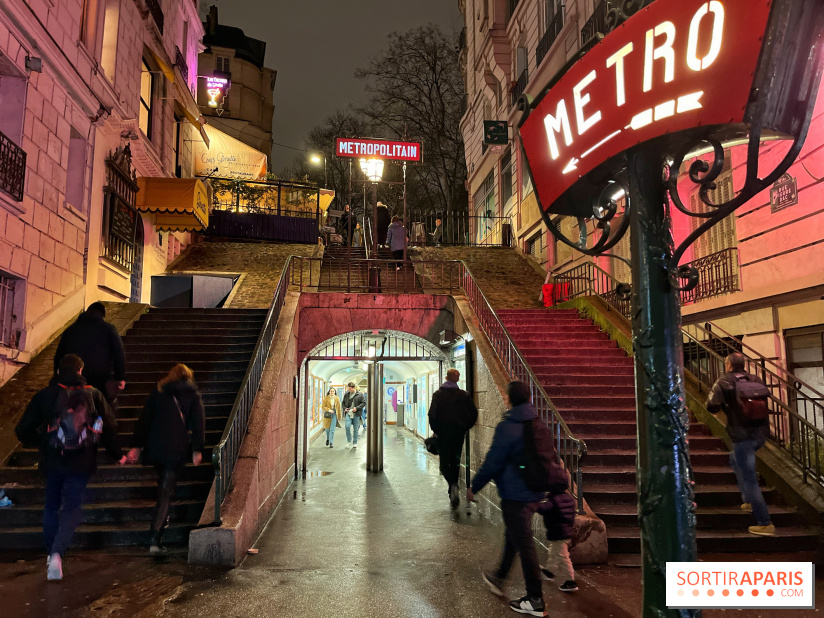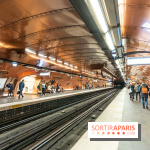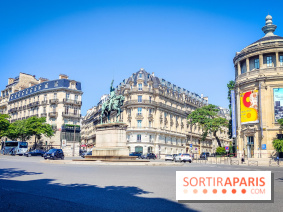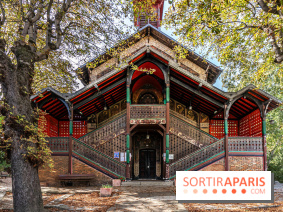The Paris metro is full of historical surprises, as it is one of the oldest in the world, inaugurated in 1900. Remnants of the Second World War, ghostly stations, hidden connections- if you take a closer look and forget about traffic problems for a moment, the metro has many anecdotes and unsuspected beauties for us to discover. And its entrances are just one of them, because as you walk through Paris, you may be surprised by a striking façade that bears no resemblance to other metro entrances.
While Parisians and tourists alike are familiar with Guimard entrances, such as those found at the Abbesses or near the Palais-Royal, some change shape and add a new dimension to the landscape, perfectly in keeping with the theme of their neighborhood.
This metro entrance is typically Montmartre, just a few minutes from Sacré-Coeur. Surrounded by a flight of steps on either side of the entrance on rue Lamarck, it's representative of the neighborhood, with its many staircases leading up to the hilltop after a good session of free sport. Hardly visible unless arriving from the front, as it is recessed, it is indicated by a lamppost on a mast (the only one in the capital) in front of the entrance, and a more traditional signal above. Despite its appeal, this station is much less busy than its neighbor, Abbesses!
Line 12 - 18th arrondissement
Built in 1923,this station was erected on a piece of land belonging to the Laënnec hospital, in line with the other buildings on the street. Signposted by two signs surmounted by a luminous globe, the entrance takes on the characteristics of the Art Deco movement, very present in buildings of the period, right down to the inscription "métropolitain". The metro station is located in the building at 42bis rue de Sèvres, close to the Sèvres-Babylone metro station, with which it shares blue and green ceramic tiles.
Metro 10 - 6th and 7th arrondissements
Opposite Le Bon Marché, this station boasts one of the city's most spectacular entrances, set deep into the ground and particularly large. It consists of a half-rotunda, with two side staircases and an escalator in the center. Like its neighboring station, it features a green metal canopy and numerous Art Deco ceramic tiles. Even today, two signs can be seen at each end, as this station was served on one side by the Nord-Sud company and on the other by the Compagnie du chemin de fer métropolitain de Paris.
Lines 10 and 12 - 6th and 7th arrondissement
This station leads directly to the Arènes de Lutèce, as can be seen from the wall on the left. The aedicula itself is of Roman-inspired ashlar, and looks almost worn by time, like the amphitheatre, the city's oldest Gallo-Roman vestige. A red sign indicates the entrance to the metro, however, so you'd be forgiven for forgetting that it's there in the first place.
Line 7 - 5th arrondissement
We also recommend exploring the entrances to Saint-Georges, set in the garden of a private mansion, Sentier and its London feel, or Saint-Jacques, with its Art Nouveau style and brickwork.
All you need to know about the Paris metro: history, anecdotes, news and rules for users
Millions of Parisians and tourists use public transport and the Paris metro system every day. But do you know the rules of the metro and its history? Discover our many anecdotes! [Read more]



















 All you need to know about the Paris metro: history, anecdotes, news and rules for users
All you need to know about the Paris metro: history, anecdotes, news and rules for users














